The Nature-Based Pathway
Bring nature to your doorsteps.
Protect the ecosystems that underpin local economies and the resilience of our communities.
Nature's Key Role
By enhancing biodiversity, ICLEI members safeguard life-supporting resources and support the well-being of their community members, both human and non-human.

Biodiversity Bootcamp
To meet the moment in this “Super Year for Nature”, when the UN convenes its Nature Conference, ICLEI USA is hosting a free 6-part “Biodiversity Bootcamp” learning-and-leadership virtual training series that will open a pathway for U.S. communities to engage with the CBD proceedings unlike ever before.
- Recognition for Communities that Join CitiesWithNature and RegionsWithNature
- Access to Tools and Peer Network
- Technical Assistance for ICLEI USA Members
Our Approach to Nature-Based Development
Analyze
Understand Your Natural Assets
Local governments establish a baseline for biodiversity action using a number of methods, such as creating a natural assets assessment, a natural assets map, or city biodiversity index. ICLEI can help you get started.
Act
Build Your Biodiverse Community
Local Biodiversity Strategy & Action Planning brings global processes to local relevance by aligning community biodiversity action to the United Nations Convention on Biological Diversity. The CitiesWIthNature platform is helping give structure to a community’s vision for developing in a way that supports, rather than diminishes, nature.
Accelerate
Collaborate and Lead the Movement
The ICLEI Cities Biodiversity Center leads our Local & Subnational Advocacy for Nature, serving as the voice for local governments to the United Nations Convention on Biological Diversity.
ICLEI USA Nature-Based Projects

Audubon Florida Local Government Operations Greenhouse Gas Inventory Cohort 2022
Municipalities and counties in the Tampa Bay, Florida Region are looking to improve Climate Action Planning efforts. However, many Florida municipalities are not yet prepared

Forest and Trees Carbon Accounting Cohort 2022
In April 2021, the United States released an updated Nationally Determined Contributionthat emphasized the role forests and urban trees play in meeting that goal by

Sustainability Planning Member Cohort
This capacity-building cohort provides structured technical assistance to guide local governments through the steps necessary to develop a Sustainability Plan. A sustainability plan addresses social,
More Projects
- Our Biodiversity Assessment & Action cohorts bring groups of communities together in a facilitated training to support nature-based planning.
- Natural Asset Maps are helping global cities in Brazil, Tanzania and India prepare for climate change and protect livelihoods.
- King County, WA worked with ICLEI to develop a baseline biodiversity assessment.
- Local Biodiversity Strategy and Action Plans have been developed in cities diverse as Johannesburg, Mexico City and Dublin to support nature-based action.
ICLEI USA Nature-Based Cohorts
Cohorts are guided group technical assistance programs that guide communities to results. Learn More.

Creating an Implementable Sustainability Plan Cohort
This capacity-building cohort provides structured technical assistance and peer-to-peer knowledge sharing to guide local governments through the steps necessary to develop an implementable sustainability plan.
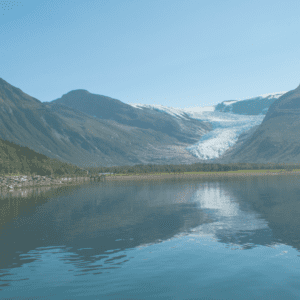
Integrating Nature into Climate Planning Cohort II
This capacity-building cohort facilitates the integration of nature into climate action planning via the ICLEI 2025-2026 Action Agenda for Nature framework for local governments to

Sustainability Planning & Implementation Cohort
This capacity-building cohort provides structured technical assistance and peer-to-peer knowledge sharing to guide local governments through the steps necessary to develop a sustainability or climate
ICLEI USA Natured-Based Resources
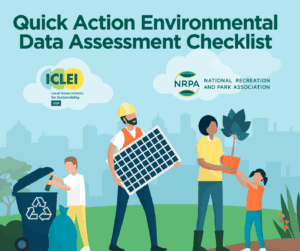
Quick Action Environmental Data Assessment Checklist
Developed in partnership with the National Recreation and Park Association (NRPA) and ICLEI USA, the Quick Action Environmental Data Assessment Checklist offers park and recreation
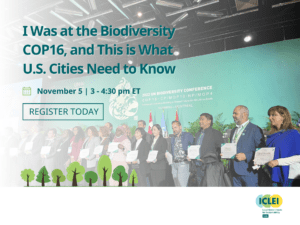
I Was at the Biodiversity COP16, and This is What U.S. Cities Need to Know
Hear from city leaders from Los Angeles, CA; Boulder, CO; and San Francisco, CA, as they share key insights from the COP16 conference, covering urban
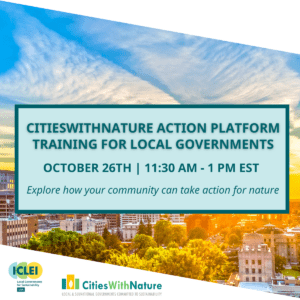
CitiesWithNature Action Platform Training for Local Governments
CitiesWithNature is the official, UN-endorsed platform for local governments taking action for nature. A space to gain technical knowledge in nature-based solutions, connect with peer
More Resources
- CitiesWIthNature is our UN-endorsed online learning and engagement platform for local governments to engage with the nature-based pathway. Free for ICLEI members and nonmembers, and supported by U.S. Pioneer communities, CitiesWithNature allows for a stepwise approach to nature-based planning.
- Subscribe to the BUZZ newsletter for city nature news.
- Learn from the Nature-Based Solutions in Cities webinar series.
- Appendix J to the U.S. Community Protocol for GHG Accounting and Reporting provides scientific method to quantify both carbon emissions and removals associated with forests and trees
- biodiverCities: A Primer on Nature in Cities
- biodiverCities: A Handbook for Municipal Biodiversity Planning and Management
Nature-Based Testimonials
"San Antonio is proud to join CitiesWithNature as a Pioneer City. Established on the banks of the San Antonio River over 300 years ago, our city continues to thrive by respecting our abundant natural resources. We know that caring for nature is essential to a sustainable future, and have prioritized biodiversity, green infrastructure and healthy ecosystems in our SA Climate Ready, Climate Action & Adaptation Plan. We celebrate this initiative and look forward to working together as stewards of our planet."
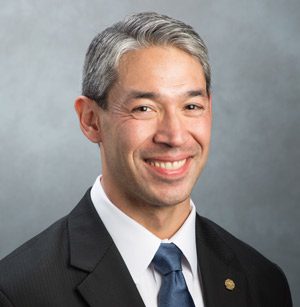
“Montgomery County jumped at the opportunity to explore the sequestration benefits associated with trees and forests. Given our aggressive GHG reduction goals of 80 percent by 2027 and carbon neutrality by 2035, increased sequestration must be in the mix of strategies we employ. The new protocol also has prompted us to think more deeply about natural climate solutions ranging from reducing the heat-island effect to increasing sequestration in the agricultural sector.”
